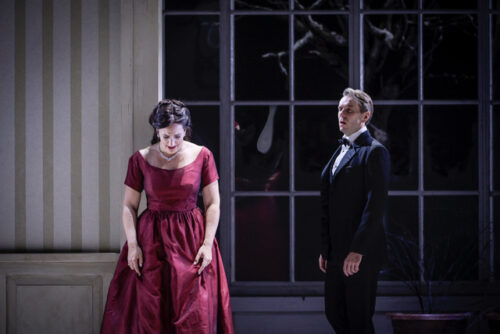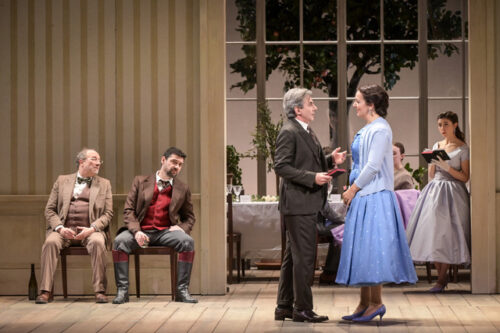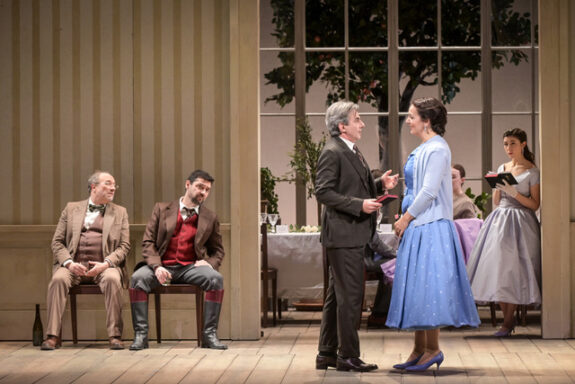 France Massenet, Werther: Soloists, Chœur d’enfants de la Maîtrise des Hauts-de-Seine, Les Siècles / Marc Leroy-Calatayud (conductor).Théâtre des Champs-Elysées, Paris, 28.3.2025. (RP)
France Massenet, Werther: Soloists, Chœur d’enfants de la Maîtrise des Hauts-de-Seine, Les Siècles / Marc Leroy-Calatayud (conductor).Théâtre des Champs-Elysées, Paris, 28.3.2025. (RP)

One is starting to run out of superlatives for Benjamin Bernheim – his Werther at the Théâtre des Champs-Elysées was superb. Christof Loy’s spare staging, first seen at La Scala in 2024, set the bar high for the musical forces with everything resting on their shoulders. Conductor Marc Leroy-Calatayud, the cast and the orchestra rose to the challenge.
Johannes Leiacker’s set features a plain interior wall with a sliding door in the center. When opened, it reveals a garden, a large table being set for a celebration or, in the final scene, a Christmas tree. Loy has moved the action to the late 1940s, as indicated by the Christian Dior New Look fashions worn by younger women. The path of Charlotte and Werther’s relationship is telegraphed in their attire, with casualness giving way to stiff formality until they collapse on the ground.
Loy takes a few liberties with the plot. A minor deviation is that Sophie, Charlotte’s younger sister, is in love with Albert. At one point, Charlotte all but shoves her into his arms. The greater departure from the libretto is in the final scene. Werther disappears with the pistol, two shots are heard, and he returns to confront Charlotte, Sophie and Albert and die. What Massenet intends as a private moment for Charlotte and Werther is a family drama. The sisters’ hair unravels as the tension mounts while Albert collapses in total despair. It is gripping but not quite kosher.
Bernheim depicts Werther’s trajectory from a young man in love to a jilted man in excruciating detail as an actor. Vocally, he is a wonder, producing a sound that is astonishingly clear and open throughout his range at any dynamic level. ‘O Nature, pleine de grâce’ was sung with tenderness in soft, clear, luminous tones. There were tears in his voice when he told Charlotte that he would die if she remained true to Albert. In ‘Pourquoi me réveiller?’, as Werther grew more certain in love, Bernheim’s voice gained intensity and volume until the final climactic high notes blazed like a trumpet.
Marina Viotti’s Charlotte evolved from a duty-bound daughter to a woman trapped in a loveless marriage with a burning desire for another man. She could be cruel, lashing out at Sophie and Albert like a caged animal. In Charlotte’s ‘Air des lettres’, Viotti reached frenzied heights of emotion as she repeated Werther’s ominous warning that she would shake with remorse. The depth and richness of Viotti’s mezzo-soprano voice was fully revealed in her emotionally devastating ‘Va! laisse couler mes larmes’ in which Charlotte tells her younger sister that it is sometimes better to grieve than be consoled.

Jean-Sébastien Bou’s Albert devolved from jealousy to emotional carnage via cruelty. His Albert adopted a self-satisfied smugness that engendered no sympathy as his wife’s betrayal played out before his eyes. Sandra Hamaoui’s Sophie was sweet and endearing, and her light, enticing soprano glittered, singing of the joys of nature in ‘Du gai soleil, plein de flamme’. This Sophie retreated into herself, clutching Charlotte’s fur coat as if it was a security blanket, as tragedy ensnared her as it did her sister and Werther.
Marc Scoffoni’s Le bailli, Charlotte’s widowed, avuncular father, eagerly taught his younger children to sing a Christmas carol in July, which the members Chœur d’enfants de la Maîtrise des Hauts-de-Seine performed with vigor and clear tone. Yuri Kissin’s Johann and Rodolphe Briand’s Schmidt had great fun as Le bailli’s easygoing, well-lubricated drinking companions.
Les Siècles performs repertoire from the seventeenth to twenty-first centuries on historical instruments appropriate to the period. The differences between a modern orchestra and one from the late-nineteenth century are not great. The sinuous vibrancy of the orchestra’s sound, nonetheless, enhanced the overwhelming cascade of emotions in Massenet’s score.
Conductor Marc Leroy-Calatayud brought youthful passion and energy to bear, commensurate with those in the opera. The sounds produced by the orchestra, from the torrents of brass and delicate, glittering harp arpeggios to those of the saxophone, enriched each dramatic turn in the story. ‘La nuit de Noël’, the orchestra interlude that unites the final two acts without pause, was pure, light and enchanting. Its beauty and tenderness made the ensuing tragedy all the harder to bear.
Rick Perdian
Production:
Director – Christof Loy
Revival director – Silvia Aurea De Stefano
Sets – Johannes Leiacker
Costumes – Robby Duiveman
Lighting – Roland Edrich
Cast:
Werther – Benjamin Bernheim
Charlotte – Marina Viotti
Albert – Jean-Sébastien Bou
Sophie – Sandra Hamaoui
Le bailli – Marc Scoffoni
Johann – Yuri Kissin
Schmidt – Rodolphe Briand
Kätchen – Johanna Monty
Brühlmann – Guilhem Begnier
